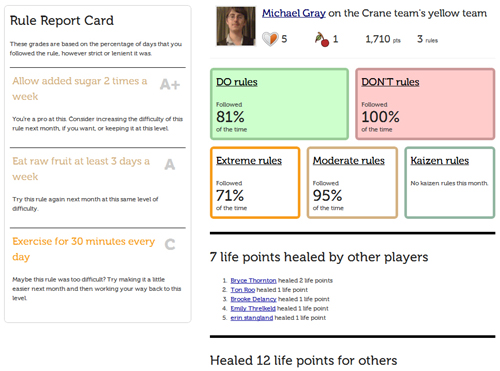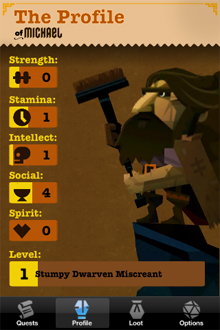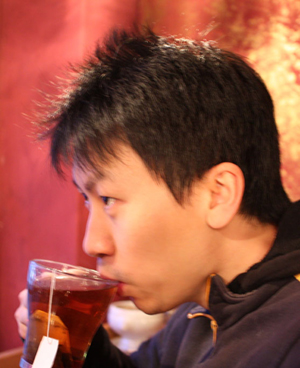This post has not been edited by the GamesBeat staff. Opinions by GamesBeat community writers do not necessarily reflect those of the staff.
Editor's note: Michael takes a look at how a website and a productivity app use game mechanics to make unpleasant tasks fun. Bonus: He interviews the site and app creators, too! -Demian
Some would say life is our biggest game. But that game can be long and hard — it's easy to lose focus and motivation. Sometimes life can be no fun.
But a few clever people out there feel our pain, and are using game mechanics to do something about it. With a bit of creativity and programming, folks such as Buster Benson (Health Month) and Tak Fung (EpicWin) have borrowed elements from gaming and crafted them into some rather nifty little life applications.
Health Month (PC)
Health Month is a new site on the block (still in Beta), and I've had the good fortune to test it out for the month of August.
Keeping up good habits is hard. When have you said to yourself, "I'm going to run every day this week"? Or "I'll make sure to eat well, starting tomorrow"? And by the end of the week you've pretty much given up. We usually have good intentions, but it's hard tricking our minds and bodies into things that just aren't fun to do. That's where Health Month comes in.
Before the start of each month you choose your rules (it's free to select up to three rules; any more and you'll have to pay $5, have a year's membership, or be sponsored by another member). You can customize each rule based on how well you currently think you're doing, what you need to do, and how hard you'll need to work at it.
Then when the month begins, you need to make sure you follow each of your rules. The next day, you have to be honest with yourself and say whether or not you did them. Each rule has winning streaks if you do them multiple days in a row, and in turn you get more points.

You start off the month with 10 life points, and the aim is to finish (the month) with positive points. You can lose points by not following your rules. To get life points back you need to ask other players to donate their fruit to you.
It all seems rather complicated, but it's easy to get the hang of it, and having a more complex system makes it more enjoyable, Plus it's got graphs, charts and lots of other cool stuff.
Health Month is a great little invention: part web application, part game. I can attest to its effectiveness. It helped me follow my rules better than if I was on my own — and I think Benson designed it in such a way that we keep on trying even when we fail.
You can sign up to play in the Beta round for September here.
Buster Benson, the creator behind Health Month, also launched 750words.com, a very useful tool for private journaling (great for us writers — my streak is 78 days in a row and still going!), and Locavore, a unique local food finder. When not creating websites, he sometimes agrees to interviews from random people.
 Michael Gray: First off how do you classify something like Health Month? Is it a game? An application?
Michael Gray: First off how do you classify something like Health Month? Is it a game? An application?
MG: What inspired you to make 750 Words and Health Month? And what are you hoping people get out of these sites?
BB: Both 750 Words and Health Month are inspired by activities that I previously did offline. Inspired by the book The Artist's Way, I have sporadically kept a private journal of stream-of-consciousness writing. I found it a really useful tool for clearing out my brain every once in a while. As for Health Month, for the last five years or so a group of friends has also tried to abstain from all of our dietary vices every January. However, over time, both practices had fallen out of habit for one reason or another. I saw an opportunity to adopt the activities, and enhance them, by bringing them online and pulling in some of the tricks that other sites have used to encourage behavior very successfully.
MG: Do you know much about the psychology behind it all? You seem to use a lot of streaks, achievements, points, etc. How do you think they trick us into doing things we'd normally avoid?
BB: Yes, I'm very interested in the whole evolution of game mechanics as it applies to these slow, online, casual, life-integrated games. I've been reading all of the books and following all of my heroes (Jane McGonigal and Dennis Crowley in particular) as they explore and learn from these ideas. I've had a phrase that I've been using to describe a lot of this to myself in my own work (43things.com in particular): "The software in our head." It's about more than just games, it's about finding the core of what motivates us, rewards us, and drives our passions.
Basically, all of these "tricks" are really just triggering complicated associations about fun, status, motivation, and enjoyment that have been evolving in our brains over millions of years. Rather than try to build everything into an application, anticipate every possibility, implement every feature, these game mechanics allow for the bulk of the work to occur in our own minds. We feel compelled to do things that our friends are doing. We feel rewarded by approval. We are motivated by our vanity. No code we write will ever have anywhere near as much power over our behavior and outlook on the world as the software in our brains.
MG: So among more traditional Health Month rules like exercise and limiting certain kinds of food, you also have rules related to reading and being social. What is your definition of being healthy?
BB: I am not trying to tell people how to be healthy, or to even say what healthy living is. I am merely looking for the "elements of health" that people who are trying to be healthy often play with, and try to change. We are all on our own health path (in either a positive or negative direction), and I think one of the major flaws of most diets and health programs is in their inflexible and dogmatic nature. I guess you could say that I'm more interested in the platform of health than in the specific health programs.
What, then, are the foundational elements of health? Part of that is healthy eating and exercise, of course. But there's more to health than a healthy body. We also have minds that need tending to…stress to manage, clarity to cultivate. And we also live in a society filled with other people and need to think about the health of our relationships with friends and family. Sometimes, even going out to a party and getting drunk with good friends can be seen as very healthy behavior. Having recently gone from being a single bachelor who went out every night and thought health was much more outwardly focused, and social, to someone married with a new son to raise, I have a particularly fresh view of several different ways of thinking about health. It's all important, but how important any particular element is to you, that's not for me to say.
MG: Do you think there's much of a market for games like this? Do you see this kind of software becoming more popular in the future?
BB: I do think there is a big market for this. Health and wellness is a pretty huge market, and I don't really think anyone in the field is really taking advantage of the great power of the Internet yet. From the few people I've talked to who might know more about that kind of stuff, they seem to agree. The question is not whether or not it will become popular, but more about who, and how soon.
MG: So that's it! Anything else you'd like to add?
BB: Thanks for asking me to do this. It definitely helped me clarify a few ideas to myself, even.
You can find Buster on Twitter, or on his website.
EpicWin (iPhone/ iPod Touch)
 EpicWin has had no trouble finding an audience. The Internet went wild over its fun and cheeky premise. Can a to-do list app actually make our most dreaded tasks bearable?
EpicWin has had no trouble finding an audience. The Internet went wild over its fun and cheeky premise. Can a to-do list app actually make our most dreaded tasks bearable?
First you need to select your character and then add your tasks (quests). For each quest you need to choose the epicness level — an amount of points ranging from 50 up to 300, and the type of quest it is. Strength, Intellect, Social, etc.
It's very much like an RPG — you earn experience and levels, and find loot along the way as you build your character. It takes a while…athough my Stumpy Dwarven Miscreant is slowly getting there.
While EpicWin doesn't have fancy features such as time scheduling or calendar syncing, it's simple and easy to use.
I've tried various to-do apps, and this is by far the most fun. And I can actually see myself continuing to use it. There's a 300 point reward awaiting me once I finish this article….
You can download EpicWin here.
EpicWin creator Tak Fung and his Supermono Studios have also developed popular iPhone/iPad games such as MiniSquadron and Fox Vs Duck. Supermono teamed up with Rexbox to make EpicWin a reality.
MG: First off how do you classify something like this? Is it a game? An application?
Tak Fung: I'd class it as an application, with game mechanics. It is first and foremost something that people use to do things with in real life, but we give it a fun angle with the RPG elements and pretty pictures!
 MG: What inspired you to make EpicWin?
MG: What inspired you to make EpicWin?
TF: EpicWin was Rex's idea of a simple way to put a bit of charm and fun into to-do lists, which we both found to be far too "uninteresting" for us. We appreciate that a lot of the to-do apps are really useful and [feature-rich]l, but we asked ourselves, "So why aren't we using them then?" We tried to answer this question, and EpicWin was the thing that popped out of Rex's mind!
MG: How does the leveling system work? I seem to be leveling up quite slowly, but I usually only have a couple of tasks per day.
TF: The levelling up at the moment is a straightforward linear progression based on how many tasks you complete. Due to feedback, we will be putting in some kind of exponential curve on the levelling up
MG: EpicWin takes a lot from Fantasy RPGs. How do you think the addictive quality behind RPGs lends to achieving everyday tasks?
TF: The idea is that we find the basic mechanic of seeing your level number go up as you do things, and collecting items as you go on your journey, to be very compelling. Ultimately, I personally think it's just a very quick feedback mechanism for what you have just done, and people enjoy that instant feel-good factor of things (pretty things!) happening after they have done something, I guess!
MG: The point system behind EpicWin requires honesty. Do you think that making it social via Twitter, etc. makes it harder for people to lie to themselves?
TF: No doubt, a social element will enforce people to be honest to a certain degree, and indeed we have plans to make the whole platform a lot more socially oriented in time. In order to help people try to be more productive, we will have to be smart with our gameplay mechanics. Having said that, though, we are not here to dictate your life! If you wish to cheat — go for it!
MG: What feedback have you most identified with from EpicWin users? Are you planning to tackle some of these suggestions in future updates? (I would love a web or desktop app!)
TF: There has been wonderful feedback from the EpicWin users, and we already have an update cooking to address some common issues, e.g., a separate screen for completed tasks, and better recurring mechanisms. There is also a big call for the more social aspects to be realised — and we agree that there is MASSIVE potential there, but all these things take time, so we will no doubt continue to work on it and hopefully acquire more resources to do so.
MG: So that's us done, anything you'd like to add?
TF: A big thank you to all the people who have tried EpicWin, your feedback and enthusiasm are all appreciated and help us to drive this thing to be the productivity app for everyone!
You can find Tak on Twitter, or on his website.
So what can we learn from all this? Games, or game-like applications, can help us achieve our goals and motivate us to take a step forward in the game of life. Whether it be monitoring your good and bad health habits through Health Month, or leveling up your task-crunching hero in EpicWin.
I really do hope these sorts of games catch on. Their purpose is to get us doing stuff, everyday — and these small, incremental changes can actually have a big effect on your life.
Share your stories of setting good habits through the addictiveness of games in the comments below!
Michael Gray writes for ButtonMasher and Game Console magazine over in a far away land that isn't part of Australia (hint: it's New Zealand). You can offer him fruit or compare dwarves over at his personal blog or Twitter.
